|
This is my dynamic, frequently updated homepage. This is a NewsLog, also known as a WebLog or Blog.
Everything is evolving, so don't assume too much.
People to watch:
Adina Levin
Andrius Kulikauskas
Britt Blaser
Catherine Austin Fitts
Chris Corrigan
Clay Shirky
Dan Gillmor
Dave Pollard
David Allen
David Weinberger
Dewayne Mikkelson
Dina Mehta
Doc Searls
Elisabet Sahtouris
Elizabeth Lawley
Euan Semple
Florian Brody
Frank Patrick
Gen Kenai
George Dafermos
George Por
Graham Hancock
Greg Elin
Hazel Henderson
Heiner Benking
Inspector Lohman
Jean Houston
Jerry Michalski
Jim McGee
Jim Moore
John Abbe
John Perry Barlow
John Robb
Joi Ito
Jon Husband
Jon Lebkowsky
Jon Udell
Jonathan Peterson
Judith Meskill
Julian Elvé
Julie Solheim
Kevin Marks
Lawrence Lessig
Leif Smith
Letecia Layson
Lilia Efimova
Lisa Rein
Marc Canter
Mark Oeltjenbruns
Mark Pilgrim
Mark Woods
Martin Dugage
Martin Roell
Mary Forest
Matt Mower
Max Sandor
Michael Fagan
Mike Owens
Mikel Maron
Mitch Kapor
Mitch Ratcliffe
Nathalie dArbeloff
Netron
Noam Chomsky
Paul Hughes
Peter Kaminski
Phil Wolff
Philippe Beaudoin
Ray Ozzie
Raymond Powers
Rebecca Blood
Roger Eaton
Roland Tanglao
Ross Mayfield
Scott Lemon
Sebastian Fiedler
Sebastien Paquet
Skip Lancaster
Spike Hall
Steven Johnson
Stuart Henshall
Thomas Burg
Thomas Madsen-Mygdal
Thomas Nicholls
Timothy Wilken
Todd Suomela
Tom Atlee
Tom Munnecke
Tom Tomorrow
Ton Zijlstra
Lionel Bruel
Loic Le Meur
Nancy White
Mark Frazier
Merlin Silk
Robert Paterson
Colby Stuart
Nova Spivack
Dan Brickley
Ariane Kiss
Vanessa Miemis
Bernd Nurnberger
Sites to watch:
Edge
Junto
Absara
Rhizome
Nanodot
HeadMap
Openworld
FutureHi
Imaginify
Do No Harm
BoingBoing
Smart Mobs
Webcamorama
MetaFilter
NotThisBody
Disinfopedia
YES Magazine
Collective Web
WorldChanging
Disinformation
Escape Velocity
Space Collective
Friendly Favors
Emergent by Design
Independent Media
Global Ideas Bank
Forbidden Science
Greater Democracy
ThoughtsOnThinking
Disclosure Project
Explorers Foundation
Manufacturing Dissent
Collective Intelligence
Action without borders
Free Expression Network
Co-intelligence Institute
Electronic Frontier Foundation
French:
Emmanuelle
Manur
Elanceur
Loeil de Mouche
IokanaaN
Blog d'Or
Le Petit Calepin
GeeBlog
Absara
Guillaume Beuvelot
Ming Chau
Serge Levan
Jean Michel Billaut
C'est pas Mécanique

I live in Toulouse, France where the time now is:
01:06
Unique Readers:

Primarily
Public Domain
Everything I've written here is dedicated to the
Public Domain.

The quotes from other people's writings, and the pictures used might or might not be copyrighted, but are considered fair use. Thus, overall, this weblog could best be described as being:
Primarily Public Domain. |
Syndication:
 ![Validate my RSS feed [Valid RSS]](http://www.newciv.org/pic/valid-rss.png)
|
| Thursday, April 10, 2003 |  |
|
|
|
 What is emergent direct democracy? It is just many people being free to make choices, and the aggregate result of that, and the hope that the result can be fairly coherent. What is emergent direct democracy? It is just many people being free to make choices, and the aggregate result of that, and the hope that the result can be fairly coherent.
Democracy is that the people decide things - that they choose what they want. In most countries in the world, that has been reduced to a ritual of every few years letting the people choose among some candidates, and the individuals they elect will then make most of the big important choices for the following years. If that is at all worthy of being called 'democracy', it certainly isn't direct democracy, and there isn't either anything very emergent about it. Yes, if the people really, really, really want things to be different, and they manage to mostly agree on that, they can start a revolution of some kind, elect somebody different from what they're offered, or force the ground rules to be changed. But there's a very high threshold to that, and it is mostly avoided by keeping people dispersed, busy, but moderately content.
Now, what would be all different would be if the democracy really consisted of all of us making choices, all the time. Not one choice per four years, but probably several or many choices per day.
[ Organization | 2003-04-10 12:07 | | PermaLink ] More >
|
|
|
|

One of Edward de Bono's numerous contributions to the discipline of creative thinking is the six thinking hats.
The idea is basically that you are aware of what thinking and communication mode you are in - what hat you are wearing. That puts things in perspective, sorts statements in a meaningful way, and makes it less likely that people misunderstand each other. E.g. if you're wearing the black hat, you might be playing devil's advocate, and put attention on things that might not work. If that is clear, and announced up front, it is likely that people will take less offense to the criticism, and it is more likely to be useful. If you announce you're wearing a red hat, irrational emotional outbursts are more acceptable, and don't necessarily have to be analyzed logically. Etc. You can have a meeting using that system. Or you can use it in brainstorming, to categorize different kinds of ideas.
Below is a more detailed explanation:
[ Knowledge | 2003-04-10 13:39 | | PermaLink ] More >
|
|
| Wednesday, April 9, 2003 |  |
|
|
|
 How do we invite democracy to emerge? How does spontaneous cooperation happen? How can humanity self-organize in more useful ways? How can we make our civilization more synergetic? How do we invite democracy to emerge? How does spontaneous cooperation happen? How can humanity self-organize in more useful ways? How can we make our civilization more synergetic?
I am here particularly interested in how we can use our existing or almost existing technologies to arrange our information and our means of communicating in such a manner as to invite these things to happen.
My instinct is that our society could be organized in a drastically different way, from the bottom up, in a way that will allow just about all of us to do productive work that we are happy with, and in a way that is vastly more productive as a whole. If we just knew how.
I believe our information networks could provide some core leverage in getting us there, but they aren't yet. It is kind of like we're almost ready to operate collectively at a much higher level, but we're still communicating with tin cans connected with string, and we all have paper bags over our heads, so we can't do anything very complex together, except for rather clumsily and haphazardly.
[ Knowledge | 2003-04-09 02:34 | | PermaLink ] More >
|
|
|
|
Lee Felsenstein is an Internet oldtimer and activist. Here's a thing from his weblog:"HOW TO MAKE A REVOLUTION in three easy steps
OK, here's the method for making sweeping, positive social change.
FIRST, everybody gets a project.
Join one or start one, but the project has to be directed toward making things better. That's what's called a "positive vector".
SECOND, everybody talks with everybody else about their projects.
That's "talks with", not just "talks to" or "talks at". This sets up a "field of communication", with information flowing in all directions. It's very important to the process, and we now have the tools (the Internet and the phone system) to make communication available without much hierarchy.
THIRD, be prepared to change your project based upon what you learn by communicating about it.
This is also very important. It "closes the feedback loop" by making the communication consequential, and, with everyone's good sense, sets up a "converging system" in the general direction of the vector.
That's it. Act, especially in concert with others, communicate and re-evaluate. Repeat as often as possible. Oh, yes - keep records of what you try and what happened , both good and bad. The system needs an element of memory to function. " OK. Organization based on each person actually having something meaningful to do, and on a process of continuous dialogue.
[ Organization | 2003-04-09 23:59 | | PermaLink ] More >
|
|
| Tuesday, April 8, 2003 |  |
|
|
|
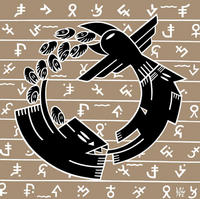 Jim Moore elaborating on his Second Superpower meme: Jim Moore elaborating on his Second Superpower meme:"How do we strengthen the Second Superpower? What are the next vital developments we need to make? Are there one or two things which, if accomplished, would enable more rapid and fuller evolution of emergent democracy and the second superpower? Are these spiritual, technical, political, or in our collective mindset?
In ecology there is a sub-field called "assembly rules" that seeks to understand the combinations of species that are required for a functioning ecosystem. The field goes farther and looks for the sequences by which a few species can establish a foundation on which others can grow. Aspen trees stabilize nitrogen in the soil, making a place for hardwoods to follow. Lichens break down volcanic rocks into a primitive soil, mosses and ferns follow.
I wonder, what are the assembly rules for emergent democracy?" Ah, yes, yes, that's the kind of questions we need to delve into. Recipes for generative diversity.
[ Organization | 2003-04-08 23:00 | 0 comments | PermaLink ]
|
|
|
|
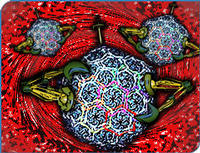 Sheldon Pacotti writes in Salon about whether or not we're doomed based on the fairly inevitable direction of technology towards much more pervasive ways of keeping an eye on all of us, and scary possibilities for destruction, beyond anything we've seen before. He particularly speaks to the discussion on whether governments should try to stop certain kinds of knowledge from being generally available. Sheldon Pacotti writes in Salon about whether or not we're doomed based on the fairly inevitable direction of technology towards much more pervasive ways of keeping an eye on all of us, and scary possibilities for destruction, beyond anything we've seen before. He particularly speaks to the discussion on whether governments should try to stop certain kinds of knowledge from being generally available."The computer-networked, digital world poses enormous threats to humanity that no government, no matter how totalitarian, can stop. A fully open society is our best chance for survival." Yeah, I agree. There's really no way of stopping it, so we need to expand our collective ability to solve problems, our collective intelligence, at least as fast as the speed that new technologies are developed at. The author talks about various sectors of society where governments might think they ought to hold on to all the knowledge. Like, surveillance. If there are cameras everywhere, do we trust government agencies with deciding what to do with what they see? No, of course not. If there has to be surveillance, the only safe thing is if it easily available to all of us."If we must submit to a surveillance society, I think it is clear that an open network, in which no group, agency, or individual is privileged over any other, would lead to a society with a superior character than one in which the citizens remain separate from and observed by the government. Better for us all to be able to watch one another than for the "authorities" to monopolize this power and leave us with only the fear." He then goes on to talk about technologies like nano-tech or genetic engineering, which quite likely might allow individuals or small groups to produce results that could kill every last one of us on the planet. How do we guard against that? Stop that kind of research? Bill Joy suggested something like that. But, no, that ain't gonna happen. There will always be some groups, military, religious, terrorist, or whatever, who will want to do it anyway. So, the question is what is most secure - share information widely, or try to keep it secret. That's the same argument that applies to computer security. Microsoft advocates to just keep all security problems really quiet and everything will be fine. The Open Source world advocates to put everything out in the open, and thousands or millions of people can all help finding the holes and plugging them. Possibly the same thing applies to other technologies."What happens, in a police bureaucracy, if someone releases a nanotech plague into the environment? If the police can suppress information on the structure of the nanobots, then only a handful of government bureaus and hand-picked researchers may be allowed to work on a cure. Millions could die waiting for the bureaucracy to solve the problem. On the other hand, if the molecular structure of the pest is published worldwide, anyone with the expertise could help design defensive technology." I'd lean in that direction. But then again, would that apply to, for example, nuclear weapons? If we all knew how to make hydrogen bombs, would some of us figure out how to make an antidote against them?
[ Knowledge | 2003-04-08 23:37 | 0 comments | PermaLink ]
|
|
| Sunday, April 6, 2003 |  |
|
|
|
I started playing with BlogShares. Joi Ito said:
"Blogshares just went beta. It is a site where you can trade shares of blogs using fake money. The price is based on trading and a valuation of sorts is derived from links weighted by how valuable the links are. (Kind of like google page rank.) This price/value spread is sort of a P/E. Obviously, this fuels the "popularity content" aspect of blogging. Having said that, it's fun. I wish I could short sell blogs. ;-) It will be interesting to see whether the blog prices predict new popular blogs accurately since people should buy blogs that are new and cool but people don't know about yet." Indeed, this if fun. A stock market for blog. I don't totally get it yet. But people have already bought shares in ming.tv, and I picked a bunch of blogs with good potential, so let's see what happens.
[ Culture | 2003-04-06 22:01 | 0 comments | PermaLink ]
|
|
|
|
George Por says:" What a delight! after writing about multi-membership here and there, I've just discovered Sébastien Paquet's concept of "community straddling" in a brief but germinal essay on Online Communities and the Future of Culture. A "community straddler is someone who participates in several communities, be it simultaneously or sequentially, and who understands the culture of each to a certain extent." Seb also says:These people do not feel irrevocably bound to a particular community. They see themselves as multidimensional: as opposed to saying "I'm a doctor, don't expect me to teach you anything" or "I'm just a programmer, don't bug me with politics", they'll say "Well, right now I'm into this and that and that, and if you have something new to show me I just might take a plunge!" As humankind's collective intellect--reflected to some extent on the web--became the most powerful force of production of our times, multi-community membership and the corresponding multi-dimensional evolution of human faculties, became harbingers of cultural and economic transformation much more profound and broader than we've ever had a chance to experience. George also pointed out in an e-mail today the leverage found in the ability to speak multiple languages, in terms of collective intelligence. American supremacy made the world learn English. But now there probably are more people who speak two or more languages in Europe than in the U.S. More people who are fluent in straddling multiple cultures.
This is all important, I think. Will become increasingly important. People who act as neurons between cells that otherwise wouldn't be connected, because they speak different languages or have different world views or specialize in different areas.
[ Organization | 2003-04-06 22:13 | | PermaLink ] More >
|
|
|
|
From CommUnityofMinds, from an article yesterday in the Toronto Star, some sobering numbers about the Iraq war.77: Percentage of Americans who support military action against any country believed to be linked to 9/11 terrorist attacks, even if innocent civilians are killed in those countries.
69: In a 2002 poll, percentage of Americans who said they believe Iraq has nuclear weapons.
O: Number of nuclear warheads in Iraq.
53.9: Estimated number of U.S. troops over the age of 20 deemed to be overweight by federal obesity standards.
$850 billion: Estimated military spending in the world in 2002.
50: Percentage spent by U.S.
0.0015: Percentage spent by Iraq.
50 per cent: Spending increase on U.S. national defense projected between 2000 and 2007.
320 metric tonnes: Amount of depleted uranium left in region after 1991 Gulf War.
200,000: Estimated number of U.S. soldiers said to be suffering from Gulf War Syndrome.
700: Between 1991 and 94, percentage increase in cancer rates in Iraq.
1 in 6: Chance the U.S. bombed Iraq on any given day last year.
9: Percentage of U.S. munitions dropped during the first Gulf War that were classified as precision-guided.
75: Percentage used during current war.
98: During the first Gulf War, the reported "success rate" (or percentage of accurate strikes) by Tomahawk cruise missiles.
10: Pentagon's estimated "success rate" after the war ended.
$750,000: Unit cost of one Tomahawk cruise missile.
725: By Thursday morning, number of Tomahawks used in Iraq.
6: Of the 10-member commission created to investigate the 9/11 terrorist attacks, the number who have direct links to the airline industry.
$3 million: Budget given to commission.
$9 billion: Estimated monthly cost for U.S. to sustain war in Iraq.
$100 billion: Estimated cost of Iraq "reconstruction."
$7.4 billion: Amount U.S. will spend on missile defense research and development this year.
70: The percentage increase in wealth gap between the top 10 per cent of American families with highest incomes and the 20 per cent of families with lowest incomes between 1998 and 2001.
400: Number of French products and companies suggested for boycott on several Web sites.
18: Number of times France has invoked its veto in United Nations history.
76: Number of times the U.S. has used its veto.
1,200: Number of American historians who signed a petition last year demanding the Bush administration respect the U.S. Constitution with respect to declaration of war.
54 to 67: By 2020, estimated percentage of crude oil that will come from Persian Gulf.
2: As a measure of proven oil reserves, ranking of Iraq among all countries.
6: Percentage of the world's population living in the U.S.
30: Percentage of the world's energy resources used in the U.S.
89: Percentage of Americans who rely on television as their first source of news during war in Iraq.
92: Between Sept. 14, 2002 and Feb. 7, 2003, percentage of news stories airing on NBC, ABC and CBS that originated directly from White House, Pentagon or State Department.
67: Between March 25 and 27, percentage of U.S. television viewers who said they felt "sad watching the war coverage."
83: Percentage of U.S. television viewers who say they now want a return to entertainment programming.
236,202: The number of times Osama bin Laden was mentioned in international media reports between Sept. 11, 2001 and Sept. 11, 2002.
57, 667: The number of times Osama bin Laden was mentioned between Sept. 11, 2002 and today.
66,648: The number of times Saddam Hussein was mentioned between Sept. 11, 2001 and Sept. 11, 2002.
225,147: The number of times Saddam Hussein was mentioned between Sept. 11, 2002 and today.
Oct. 2, 2002: Date the American Gulf War Veterans Association called for the resignation of U.S. Defense Secretary Donald Rumsfeld after he denied the U.S. sent biological weapons to Iraq during the 1980s.
38: In a 2002 poll, percentage of Americans who said Canada should be annexed.
13: Percentage of Americans between the ages of 18 and 24 who could find Iraq on a map prior to the war.
16,000: Number of inactive military ranges in the U.S. that have unexploded munitions that pose serious environmental hazards.
1.5 million: Number of Internet "hits" the Iraq Body Count Web site has had since the war began.
52: Percentage of these visitors who are from the United States.
50: Percentage of weapons entering the global market that come from American firms.
10: Percentage of U.S. military spending that would provide global population with basic necessities.
1: Number of countries that have used nuclear weapons against another country. Get the picture? But does this make a difference for the general public? So many of us are so disconnected from reality and from our logical faculties that even clear facts make little difference.
[ Information | 2003-04-06 22:26 | | PermaLink ] More >
|
|
|
|
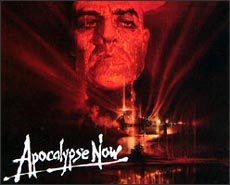 BBC about George W. Bush and his conviction that God wants him to engage the forces of evil. BBC about George W. Bush and his conviction that God wants him to engage the forces of evil. He had turned to God at the age of 40 as a way of kicking alcoholism, and his faith had kept him on the straight and narrow ever since, giving him the drive to reach the White House.
But all that changed on the day of the attacks on the Pentagon and World Trade Center.Those close to Mr Bush say that day he discovered his life's mission.
He became convinced that God was calling him to engage the forces of evil in battle, and this one time baseball-team owner from Texas did not shrink from the task. Pretty freaky, really, if Bush really thinks he's now battling the anti-Christ. And nearly all mainland churches in the U.S. are uncomfortable with that as well, and are opposing the war.
I'm not particularly religious, but if I were adhering to the idea of a Christian God (or Jewish or Islamic), I'd be very uncomfortable with the idea that a U.S. president thinks that this God reports to him. That's not what he says in words, but that is the structure of what he says. That God is on his side in the war, and that God will back up his decisions. That does sound like some kind of blasphemy to me. No other U.S. president have had any such hubris in the past.
For that matter, if it wasn't so tragic and dangerous, it would be sort of funny. The fate of the world is in the hands of an illiterate alcoholic delusional coke-head, who hears voices in his head about how he's chosen for a special mission, and who pays little attention to what is going on in the real world. What makes it dangerous is that a sufficiently large percentage of the American population believe in the same comic book vision.
[ Politics | 2003-04-06 22:57 | | PermaLink ] More >
|
|
|
|
This one is very funny. A piece of humor that catches the gist of the pro-war mood really well. It is all about an old woman out there on the ice, and a Winnebago full of boy scouts, and a protester who just can't seem to understand what is the MORAL way to go.
[ Politics | 2003-04-06 23:17 | | PermaLink ] More >
|
|
| Saturday, April 5, 2003 |  |
|
|
|
 Thinking is one subject I'm really interested in. Our ability to think abstractly is one of the key traits that define what a human is. Yet we seem to have little clue how we do it, or how we might do it better. Our future depends, of course, on what choices we arrive at, individually and collectively. And yet, most of us don't have any better strategy than picking the strongest thought that appears in our head, or our stomach, or wherever it appears, and assuming that this is our answer. Without examining where it came from, and without having the faintest clue as to HOW to think. Thinking is one subject I'm really interested in. Our ability to think abstractly is one of the key traits that define what a human is. Yet we seem to have little clue how we do it, or how we might do it better. Our future depends, of course, on what choices we arrive at, individually and collectively. And yet, most of us don't have any better strategy than picking the strongest thought that appears in our head, or our stomach, or wherever it appears, and assuming that this is our answer. Without examining where it came from, and without having the faintest clue as to HOW to think.
I got to *think* about that again, as I saw a page about Edward de Bono's latest book "Why So Stupid?" which seems to reflect just that dillemma, and apparently provide some answers. From the foreword:"Maybe we have neglected thinking. Maybe we have taken it for granted. Maybe we have believed, and still believe, that there is nothing more that can be done about thinking. We have an excellent 'thinking system' and nothing more needs to be done.
That is where I disagree. We do have an excellent thinking system - but it is inadequate. Our thinking system is all directed at the past. We recognize standard situations and provide standard answers. We have never developed the creative thinking needed to design the way forward. Our thinking is excellent for technology and almost useless in human affairs." I have several of de Bono's books, which are excellent. And yet I'm a bit suspicious about why somebody needs to write 65 books about essentially the same thing - creativity and thinking. But, whether he could really have said it all in one book, de Bono has some fine tools and insights to offer, and is an undisputed authority in that field. Here's another little tidbit from his website:"The majority of mistakes in ordinary thinking (outside technical matters) are mistakes in perception. Our traditional emphasis on logic does little for perception. If the perception is inadequate no amount of excellence in logic will make up for that deficiency.
Perception is a matter of directing attention. If you are not looking in the right direction it does not matter how clever you are, you will not see what you need to see." Right on. It doesn't matter if you eloquently and 'logically' can deduct yourself from one point to the next, if you didn't perceive what really is there, or you were looking at only a small part of it, or you were looking at the wrong thing. Most people have a certain innate sense of logic, but if the input is faulty, so is the result.
[ Patterns | 2003-04-05 22:01 | | PermaLink ] More >
|
|
|
|
Andrius Kulikauskas called me from Lithuania yesterday and we had a good long discussion about him getting involved in Xpertweb, and just brainstorming on things. We already know each other, but after he talked with Mitch and with Britt, it seems that some expanded collaboration is a good idea.
Andrius is a champion of working openly. He's been inquiring into economies that will support that. He is quite a magnetizing force for people who're working on tools for capturing structured thought. We believe in many of the same things. At the same time he draws on mysteriously different sources, and is quite likely to bring up issues that otherwise wouldn't be touched, and that is a good thing.
Look at some of Andrius's thoughts and ideas concerning Xpertweb.
[ Knowledge | 2003-04-05 22:27 | | PermaLink ] More >
|
|
|
|
 One of my favorite Alan Watts books is "The Book (On the Taboo Against Knowing Who You Are)". Here's from the first chapter: One of my favorite Alan Watts books is "The Book (On the Taboo Against Knowing Who You Are)". Here's from the first chapter:"It is a special kind of enlightenment to have this feeling that the usual, the way things normally are, is odd--uncanny and highly improbable. G. K. Chesterton once said that it is one thing to be amazed at a gorgon or a griffin, creatures which do not exist; but it is quite another and much higher thing to be amazed at a rhinoceros or a giraffe, creatures which do exist and look as if they don't. This feeling of universal oddity includes a basic and intense wondering about the sense of things. Why, of all possible worlds, this colossal and apparently unnecessary multitude of galaxies in a mysteriously curved space-time continuum, these myriads of differing tube-species playing frantic games of one-upmanship, these numberless ways of "doing it" from the elegant architecture of the snow crystal or the diatom to the startling magnificence of the lyrebird or the peacock?
Ludwig Wittgenstein and other modern "logical" philosophers have tried to suppress this question by saying that it has no meaning and ought not to be asked. Most philosophical problems are to be solved by getting rid of them, by coming to the point where you see that such questions as "Why this universe?" are a kind of intellectual neurosis, a misuse of words in that the question sounds sensible but is actually as meaningless as asking "Where is this universe?" when the only things that are anywhere must be somewhere inside the universe. The task of philosophy is to cure people of such nonsense, Wittgenstein, as we shall see, had a point there. Nevertheless wonder is not a disease. Wonder, and its expression in poetry and the arts, are among the most important things which seem to distinguish men from other animals and intelligent and sensitive people from morons.
Is there, then, some kind of a lowdown on this astounding scheme of things, something that never really gets out through the usual channels for the Answer--the historic religions and philosophies? There is. It has been said again and again, but in such a fashion that we, today, in this particular civilization do not hear it. We do not realize that it is utterly subversive, not so much in the political and moral sense, as in that it turns our ordinary view of things, our common sense, inside out and upside down. It may of course have political and moral consequences, but as yet we have no clear idea of what they may be. Hitherto this inner revolution of the mind has been confined to rather isolated individuals; it has never, to my knowledge, been widely characteristic of communities or societies. It has often been thought too dangerous for that. Hence the taboo." Well, really Alan Watts is best to listen to, rather than read. There are many tapes of his talks, from the 60s. But in that book he presents a remarkably lucid explanation of what you are. Another way of putting it is that he takes apart the poorly founded illusion that you are a separate ego, isolated from and in conflict with the rest of the world. What is cool about it is that it is not in the form of mystical beliefs, but in the form of logical deduction, which you'd have a hard time arguing against. Thus it might be a way for compartmentalized western minds to come to terms with something bigger, without having to give up a belief in science and logic. There just really is no proof for the irrational belief that you're separate from the rest of the world. And if you accept the inevitable conclusion, everything is different.
[ Inspiration | 2003-04-05 23:10 | | PermaLink ] More >
|
|
|
|
From an anthropology research paper
"Both laboratory and field data suggest that people punish noncooperators even in one-shot interactions. Although such "altruistic punishment" may explain the high levels of cooperation in human societies, it creates an evolutionary puzzle: existing models suggest that altruistic cooperation among nonrelatives is evolutionarily stable only in small groups. Thus, applying such models to the evolution of altruistic punishment leads to the prediction that people will not incur costs to punish others to provide benefits to large groups of nonrelatives. However, here we show that an important asymmetry between altruistic cooperation and altruistic punishment allows altruistic punishment to evolve in populations engaged in one-time, anonymous interactions. This process allows both altruistic punishment and altruistic cooperation to be maintained even when groups are large and other parameter values approximate conditions that characterize cultural evolution in the small-scale societies in which humans lived for most of our prehistory." Hm, so if I understand it right, most people will punish non-cooperative anti-social behavior when they have the chance, even if they have nothing directly to gain from it, and even if it doesn't produce visible increases in cooperation. And that people mostly have succeeded in collaborating in small groups, but not so much in large groups. Well, what I get out of that is that people are looking for widespread cooperation, and they're making choices to support it, but the right tools for crystalizing it haven't quite appeared yet.
[ Patterns | 2003-04-05 23:59 | | PermaLink ] More >
|
|
| Friday, April 4, 2003 |  |
|
|
|
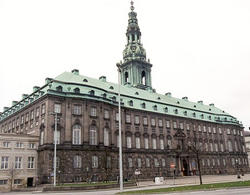 One thing I appreciate about how Denmark is run, which I didn't see the same way when I lived there, is that people who are in the position to decide big things will talk it over, seemingly endlessly. Well, that's what it used to look like to me. The news is filled with politicians talking and talking; people speaking for many different sides; nobody apparently committed to much of anything. That is drastically different from the U.S. where the news is filled first of all with disasters, and secondly with politicians who seem very sure about everything, but who only seem to have the opinions they're being paid for having by their corporate handlers. And nobody actually *talks* things over. It is more about getting your side to win, through force, persuasion, lies, money, diversion, or whatever it takes. One thing I appreciate about how Denmark is run, which I didn't see the same way when I lived there, is that people who are in the position to decide big things will talk it over, seemingly endlessly. Well, that's what it used to look like to me. The news is filled with politicians talking and talking; people speaking for many different sides; nobody apparently committed to much of anything. That is drastically different from the U.S. where the news is filled first of all with disasters, and secondly with politicians who seem very sure about everything, but who only seem to have the opinions they're being paid for having by their corporate handlers. And nobody actually *talks* things over. It is more about getting your side to win, through force, persuasion, lies, money, diversion, or whatever it takes.
In Denmark, the politicians actually seem to be there to talk things through, so that the right decisions can be made. And even though everybody still hates most of them, and even though it takes a while to get anywhere, it is quite real. Working things through with everybody who has a stake is a shared value. Most politicians will be very non-committal, and will refer to that things have to be talked through before they can state anything with certainty. And what I realize now is that this is a good thing. A commitment to dialogue and consensus and openness. Most Danes will probably not agree or recognize this, and will probably tell me that the politicians really are a bunch of crooks, and that nothing gets done, and everything is really bad. But, seeing it from the outside, and only visiting once in a while, things are not too bad in Denmark. It is a wealthy country that takes good care of its people. People are friendly, and everything works. It all looks better than it did when I moved from there 18 years ago. Something is working.
Thomas Madsen Mygdal predicts that the next Danish prime minister will have a weblog. He might very well be right. Whereas it wouldn't work for the current style of politicians in the U.S., it would work well for most Danish politicians.
As a matter of fact, the prior Danish prime minister, Poul Nyrup Rasmussen, now has a weblog. It is in Danish, so chances are you can't read it. But it is real. He talks about what he does every day and what he feels about it. That is a real big thing, for a politician to be open like that. And I hope the world sees more of that.
[ Politics | 2003-04-04 12:16 | 0 comments | PermaLink ]
|
|
|
|
 Jim Moore has an excellent article: The Second Superpower Rears its Beautiful Head and a new weblog. Jim Moore has an excellent article: The Second Superpower Rears its Beautiful Head and a new weblog."As the United States government becomes more belligerent in using its power in the world, many people are longing for a "second superpower" that can keep the US in check. Indeed, many people desire a superpower that speaks for the interests of planetary society, for long-term well-being, and that encourages broad participation in the democratic process. Where can the world find such a second superpower? No nation or group of nations seems able to play this role, although the European Union sometimes seeks to, working in concert with a variety of institutions in the field of international law, including the United Nations. But even the common might of the European nations is barely a match for the current power of the United States.
There is an emerging second superpower, but it is not a nation. Instead, it is a new form of international player, constituted by the "will of the people" in a global social movement. The beautiful but deeply agitated face of this second superpower is the worldwide peace campaign, but the body of the movement is made up of millions of people concerned with a broad agenda that includes social development, environmentalism, health, and human rights. This movement has a surprisingly agile and muscular body of citizen activists who identify their interests with world society as a whole—and who recognize that at a fundamental level we are all one. These are people who are attempting to take into account the needs and dreams of all 6.3 billion people in the world—and not just the members of one or another nation. Consider the members of Amnesty International who write letters on behalf of prisoners of conscience, and the millions of Americans who are participating in email actions against the war in Iraq. Or the physicians who contribute their time to Doctors Without Borders/ Medecins Sans Frontieres.
While some of the leaders have become highly visible, what is perhaps most interesting about this global movement is that it is not really directed by visible leaders, but, as we will see, by the collective, emergent action of its millions of participants." Great stuff. This article has gotten quite some attentionon the net in the past few days, and the meme seems to be taking hold. Moore somewhat equates the power he's talking about with the peace movement, which probably isn't necessary, although it is a good example. The key point is that there's a new mechanism at play here."Thus the new superpower demonstrates a new form of "emergent democracy" that differs from the participative democracy of the US government. Where political participation in the United States is exercised mainly through rare exercises of voting, participation in the second superpower movement occurs continuously through participation in a variety of web-enabled initiatives. And where deliberation in the first superpower is done primarily by a few elected or appointed officials, deliberation in the second superpower is done by each individual—making sense of events, communicating with others, and deciding whether and how to join in community actions. Finally, where participation in democracy in the first superpower feels remote to most citizens, the emergent democracy of the second superpower is alive with touching and being touched by each other, as the community works to create wisdom and to take action." Count me in. Moore's article naturally also attracted some flak on the net. I'm not going to link to the few people who didn't like it. But it is always interesting to see who feels very threatened by subjects such as freedom, openness, self-organization, collective consciousness, leaderless organization, and that kind of thing."Which brings us to the most important point: the vital role of the individual. The shared, collective mind of the second superpower is made up of many individual human minds—your mind and my mind—together we create the movement. In traditional democracy our minds don’t matter much—what matters are the minds of those with power of position, and the minds of those that staff and lobby them. In the emergent democracy of the second superpower, each of our minds matters a lot. For example, any one of us can launch an idea. Any one of us can write a blog, send out an email, create a list. Not every idea will take hold in the big mind of the second superpower—but the one that eventually catches fire is started by an individual. And in the peer-oriented world of the second superpower, many more of us have the opportunity to craft submissions, and take a shot." Finally Moore proposes a bit of the HOW in how we get there:"First, we need to become conscious of the "mental processes" in which we are involved as members of the second superpower, and explore how to make our individual sense-making and collective action more and more effective. This of course means challenging and improving the mass media, and supporting more interactive and less biased alternatives. But more ambitiously, we will need to develop a kind of meta-discipline, an organizational psychology of our community, to explore the nature of our web-enabled, person-centered, global governance and communication processes, and continue to improve them." It is all quote obvious, of course. Of course WE, the people of this planet, are the real power here. It is only because we're badly organized, badly informed, and communicating badly, that a very, very small percentage of us, who are better organized, can drag the rest of us around by the nose. What is going to change all of it is a form of organization that will ONLY work for all of us, and that will be of no use for the old power elite. You can call it self-organization, emergent democracy, the transparent society, the global brain, or whatever, but it is sure to make the old structures become gradually irrelevant once we get a better sense of it. It is a huge threat to the power elite, and to the traditional superpower(s), but the kicker is that it really makes no sense to them, so they will probably not succeed in suppressing it. They will try, but those attempts will look increasingly obvious and strange.
[ Organization | 2003-04-04 13:38 | | PermaLink ] More >
|
|
|
|
 Jewel posts some great quotes from comedians, that succeed in presenting the paradoxical truth in one-liners, like nothing else could. Some examples: Jewel posts some great quotes from comedians, that succeed in presenting the paradoxical truth in one-liners, like nothing else could. Some examples:"War continues in Iraq. They're calling it Operation Iraqi Freedom. They were going to call it Operation Iraqi Liberation until they realized that spells 'OIL.'" -- Jay Leno
"President Bush has said that he does not need approval from the UN to wage war, and I'm thinking, well, hell, he didn't need the approval of the American voters to become president, either." -- David Letterman
"In a speech earlier today President Bush said if Iraq gets rid of Saddam Hussein, he will help the Iraqi people with food, medicine, supplies, housing, education ? anything that's needed. Isn't that amazing? He finally comes up with a domestic agenda ? and it's for Iraq. Maybe we could bring that here if it works out." -- Jay Leno
[ Opinions | 2003-04-04 15:00 | | PermaLink ] More >
|
|
|
|
 Britt has an excellent post, Sitting in the Counting House, referencing a post by Ross Mayfield that notes how the presence of counting tools change the game. When coins were introduced in market places, new things became possible. Now, with the prospect of introducing reliable ratings into economic transactions, it might change things significantly. Now Britt says some good things like: Britt has an excellent post, Sitting in the Counting House, referencing a post by Ross Mayfield that notes how the presence of counting tools change the game. When coins were introduced in market places, new things became possible. Now, with the prospect of introducing reliable ratings into economic transactions, it might change things significantly. Now Britt says some good things like:"We need to get our hands around the choke point that's preventing the right things from being counted. I suggest that the check point is who controls the data and thus the character of the data kept. We assume that data is always kept by the seller, but is that so?
Consider this:- Whenever a seller and a buyer intersect, the data is maintained by the seller, as we expect.
- Whenever an employer and an employee intersect, the data is maintained by the employer. (Who is the buyer of the services.)
In the first case, the data keeper is the seller, not the customer. In the second, though, the keeper of the data is the customer, purchasing the employee's work. So it's not about the roles of the players, It's about size and who is the designer of the transaction. Data is the asset of the designer of the business agreement, and a liability to the other party to the agreement, who's subservient to the keeper's records.
I emphasize designer of the transaction because transactions are designed ad hoc, one-at-a-time, like component parts in machines before Eli Whitney invented standardized parts. Perhaps our economy has become too complicated to let transactions be designed for the sole benefit of whoever thinks it up first and has superior data resources." Excellent observations, and then this core point:Proprietary Data is the Basis of Tyranny Yep. So the advantage is usually with the people who decide what data is captured and how, and who control access to that data. That explains a helluva lot of things about our society. Even the money system is based on that, by making sure that the information called dollars and cents can only be created according to certain rules, designed by those who have the most to gain from them. And media companies with eternal copyrights - same thing. And governments who allow themselves to gather information that the rest of us aren't allowed to look at.
The action item for us is to figure out how to count things that aren't counted, in regards to the quality and history of many things, and the activities of people and companies, and to make that data easily available and impossible to hide. If good, reliable data is widely and freely available, that allows us to make informed decisions on who and what to deal with, and who and what to avoid - it is going to be very hard to try to force us to do anything less.
[ Organization | 2003-04-04 19:01 | 0 comments | PermaLink ]
|
|
| Thursday, April 3, 2003 |  |
|
|
|
Always nice to be home and sleep in one's own bed. The journey back was pretty long. Because of the complexities of getting cheap airplane tickets we had to fly back to Toulouse from Copenhagen and spend the night there, and the jouney back from there had three jumps, because nothing better was available when I ordered it. But the Continental flight from Amsterdam to Houston (the middle leg) was almost empty, so we could each spread over a row and sleep. Nothing major went wrong. Missed a transfer flight in Paris and had to wait for the next one. My wife and I were sick at different times along the way, but got over it quickly. The taxi driver in Toulouse knocked over a mother with her kids in a stroller. They were all miraculously unscathed.
It was a short trip, but accomplished what it needed to - getting a sense of the South of France, and going to my mom's birthday in Denmark.
I always enjoy noticing the differences between people in different areas and in different groups, how people have different world views and act differently. Anyway, more on that some other time when I'm less jet lagged.
[ Diary | 2003-04-03 20:54 | 0 comments | PermaLink ]
|
|
| Tuesday, April 1, 2003 |  |
|
|
|
 Seb mentions Peter Tesugen analyzing Edward de Bono's principles of simplicity, from his book "Simplicity". These are the principles: Seb mentions Peter Tesugen analyzing Edward de Bono's principles of simplicity, from his book "Simplicity". These are the principles:1. You need to put a very high value on simplicity
2. You must be determined to seek simplicity
3. You need to understand the matter very well
4. You need to design alternatives and possibilities
5. You need to challenge and discard existing elements
6. You need to be prepared to start over again
7. You need to use concepts
8. You may need to break things down into smaller units
9. You need to be prepared to trade off other things for simplicity
10. You need to know for whose sake the simplicity is being designed
Peter has a good discussion about what the less obvious points are about.
[ Patterns | 2003-04-01 00:29 | | PermaLink ] More >
|
|
| Monday, March 31, 2003 |  |
|
|
|
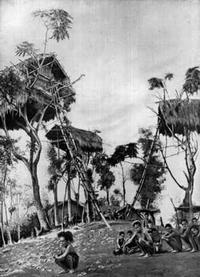 Marshall Sahlins is the author of Stone-Age Economics, which is an interesting read, in part about gift economies and how pre-historic economic systems weren't as miserable as they're commonly believed to be. Here is something from the article The Original Affluent Society: Marshall Sahlins is the author of Stone-Age Economics, which is an interesting read, in part about gift economies and how pre-historic economic systems weren't as miserable as they're commonly believed to be. Here is something from the article The Original Affluent Society:"There are two possible courses to affluence. Wants may be "easily satisfied" either by producing much or desiring little The familiar conception, the Galbraithean way- based on the concept of market economies- states that man's wants are great, not to say infinite, whereas his means are limited, although they can be improved. Thus, the gap between means and ends can be narrowed by industrial productivity, at least to the point that "urgent goods" become plentiful. But there is also a Zen road to affluence, which states that human material wants are finite and few, and technical means unchanging but on the whole adequate. Adopting the Zen strategy, a people can enjoy an unparalleled material plenty - with a low standard of living. That, I think, describes the hunters. And it helps explain some of their more curious economic behaviour: their "prodigality" for example- the inclination to consume at once all stocks on hand, as if they had it made. Free from market obsessions of scarcity, hunters' economic propensities may be more consistently predicated on abundance than our own." Sahlins explains how typical hunter-gatherers work 3-5 hours per day on acquiring food, and they have plenty of time for leisure. For that matter, they have a schedule that most civilized people would be sort of envious about. The more 'civilized' we become, the harder we tend to work, and the less time we have for leisure. He also makes some interesting distinctions between primitive living and poverty. In hunter-gatherer cultures starvation would be pretty much unthinkable."The world's most primitive people have few possessions. but they are not poor. Poverty is not a certain small amount of goods, nor is it just a relation between means and ends; above all it is a relation between people. Poverty is a social status. As such it is the invention of civilisation. It has grown with civilisation, at once as an invidious distinction between classes and more importantly as a tributary relation that can render agrarian peasants more susceptible to natural catastrophes than any winter camp of Alaskan Eskimo." I'm not sure what we can learn here, other than that it is possible to successfully live very simply and modestly. There must be some kind of point that applies also to a technological civilization. A just-in-time kind of thinking. We could very well arrange our world so that nobody ever has to starve and so we only work a few hours per day. From what I hear, only 2-3 percent of our work relates to actual production, and from my own observation, the majority of human work is inefficient or unnecessary, just arranged to keep people busy. So, why can't we have a an efficient and productive, but leisurely and relaxed, high tech society, where it would be unthinkable that basic needs wouldn't be filled?
[ Organization | 2003-03-31 06:18 | | PermaLink ] More >
|
|
|
|
NBC has fired veteran reporter Peter Arnett because he told Iraqi television that the U.S. war plan against Saddam Hussein had failed. In 1998 he was fired from CNN after the Pentagon complained about a documentary he did on how the U.S. used Sarin gas on American defectors in Laos. And Arnett both times apologized and sort of withdrew what he said. Would be better if he just stuck with the truth he said in the first place, I think.
[ News | 2003-03-31 08:51 | 0 comments | PermaLink ]
|
|
|
|
The head of Indonesia's highest legislative body today urged the United Nations to bring George W Bush and Tony Blair before a war crimes tribunal for launching the war against Iraq. Yeah, that would be a good thing. But probably not likely unless they mess up much more badly.
[ News | 2003-03-31 09:02 | | PermaLink ] More >
|
|
|
|
BitTorrent is a new peer-to-peer distribution mechanism for large data files. It makes it possible to share a file without being bogged down with traffic if it happens to become popular. Each person who downloads it becomes a new source of it. Files are both uploaded and downloaded to many places at the same time. See an introduction here on Slashdot. There's apparently not any snazzy graphical interface to it yet, so it still mostly for techies.
[ Technology | 2003-03-31 12:46 | 0 comments | PermaLink ]
|
|
|
|
 Scientists have discovered a way of recognizing the signs of life in rock formations. Essentially: create a digital image of the rock; then compress the image file. The more the file shrinks, the more likely it is that life was responsible for building the layers. Scientists have discovered a way of recognizing the signs of life in rock formations. Essentially: create a digital image of the rock; then compress the image file. The more the file shrinks, the more likely it is that life was responsible for building the layers.Although biological stromatolites and non-biological stromatolite-look-alike structures appear similar to the human eye, the biological origin of stromatolites makes them more ordered, more highly patterned. And it is this patterning that, while hard for the human eye to discern, is readily detected by the compression algorithm. Non-biological stromatolite-like structures are more random, less patterned and therefore less compressible. An online test is here. Hm, interesting. Is higher life forms more or less compressible? Would the ultimate life forms be the most compressible and embeddable? Does all of life reduce to a beautiful little formula?
[ Nature | 2003-03-31 13:26 | | PermaLink ] More >
|
|
| Sunday, March 30, 2003 |  |
|
|
|
 Chris Corrigan mentions how it is a bit strange when the content of a weblog suddenly changes because its author is in different circumstances. Like here I'm for a couple of weeks vacationing in Europe. My weblog looks the same on the surface, but suddenly I'm just writing about little towns in France instead of about systems and technology and the world situation. Chris Corrigan mentions how it is a bit strange when the content of a weblog suddenly changes because its author is in different circumstances. Like here I'm for a couple of weeks vacationing in Europe. My weblog looks the same on the surface, but suddenly I'm just writing about little towns in France instead of about systems and technology and the world situation.
When I'm traveling I really notice how my normal style of blogging depends on many factors than I normally don't think much about, and how I'm sort of lacking a format for blogging what I'm actually doing.
Typically I work at my computer many hours per day and quite naturally I browse a lot of information sources, so I can maintain a certain overview. And I seem to have peace and quiet to sit and philosophize about things, and it seems natural to talk about self-organization or alternative economic systems or other meta subjects. And I don't have a great urge to talk about my physical environment or what I actually do each day.
But if for example I travel, my mind is more on where my suitcases are, on what I'm getting for dinner, who I'm meeting, and how it looks where I am. Very different thing. Much more sensory input, but less abstract input, and much less chance to sit quietly and talk about any of it.
When I'm on the move, what I could use would probably be a simple mob-log technology, where I could post photos and short notes from a cell phone or something. And probably I'd prefer for that to go in a sidebar to my normal weblog.
It is obvious that there are different styles of weblogging. For some people it is simply recording what they do and think each day, and what they have for breakfast. For some, their postings are driven by what is in the news. For some, like for me I think, there is a certain meta thread that goes through what they want to talk about, even if the pieces might be sort of haphazard, and might or might not have anything to do with the 'news'. Some people manage to find a style that brings all of it together. Doc Searls says his weblog is simply that he answers his e-mail in public. Dave Winer seems to have a style where car trips and family matters work well on equal footing with technical issues and bigger meta issues.
For some people, the ultimate of weblogging would be to have a camera attached to your head that would record everything that happened to you. For others the ideal would be a news studio or newspaper editorial office with hundreds of incoming feeds that you can select from. Others again would prefer a quiet spot away from all disturbances, where they can sit down and write about what they think, all by themselves. I suppose I'd prefer a combination of all of those.
[ Diary | 2003-03-30 03:31 | | PermaLink ] More >
|
|
|
|
 Paul Hughes does some excellent thinking about really big questions, like the possible origin of the laws of the universe. Paul Hughes does some excellent thinking about really big questions, like the possible origin of the laws of the universe."I have been engaging in some discussion lately about the begining of the universe, and for the first time (amazingly enough) I pushed the 'Where did it come from' question through as far as it can go. And, not surprisingly, it doesn't go anywhere. No matter how you try to explain the origin of the universe, none of the theories can account for the cause of it. What caused the big bang? Where did 'God' come from? etc.
From this, i concluded that there cannot be a begining. If there was a begining, then something must have caused that begining, and so something was there before the begining.
This doesn't answer anything, but I am yet to see another way around the causality problem (defining something as 'acausal' doesn't solve it, it just dodges it).
Now, linked to this 'where did the universe come from?' problem is, 'Where did the incredible laws, which make our universe a coherent place come from?', which is what I think underlies it all. Once the universe began, it is easy to say 'the laws guided the evolution of everything from there'....but how did the laws come to be? Why are they so perfect?" I wish more people would be able to discuss things like that intelligently. Many will merely, if they even try, end up with some silly circular reasoning or 'just because!' kind of answer. I'm not sure I end up in the exact same place as Paul does - that there are no fundamental laws. But then again, I agree that anything is possible, so maybe we do see it the same way. Either way, this would be a great discussion to spend a few hours on.
As Paul points out, any kind of explanation that is built on ideas such as 'that is how evolution works', or 'it is all random' or 'God created it all' or 'it all follows logically from a Big Bang' - are just sort of starting in the middle and not explaning how that arrangement came about.
The best guard against closed-minded fundamentalism, of the religious or scientific kind, would be to invite more discussions like that. And to invite more of us to be comfortable with the uncertainty you run into when you probe deeply enough into how things work.
[ Knowledge | 2003-03-30 13:54 | | PermaLink ] More >
|
|
<< Newer stories Page: 1 ... 61 62 63 64 65 ... 97 Older stories >> |
|

This is a collage of things that catch my eye, things that need to be said, and stuff I really care about
TRUTH
BEAUTY
FREEDOM
LOVE
TECHNOLOGY
|
| Mon | Tue | Wed | Thu | Fri | Sat | Sun |
|---|
|
|
|
|
|
|
1 |
| 2 |
3 |
4 |
5 |
6 |
7 |
8 |
| 9 |
10 |
11 |
12 |
13 |
14 |
15 |
| 16 |
17 |
18 |
19 |
20 |
21 |
22 |
| 23 |
24 |
25 |
26 |
27 |
28 |
|
|




